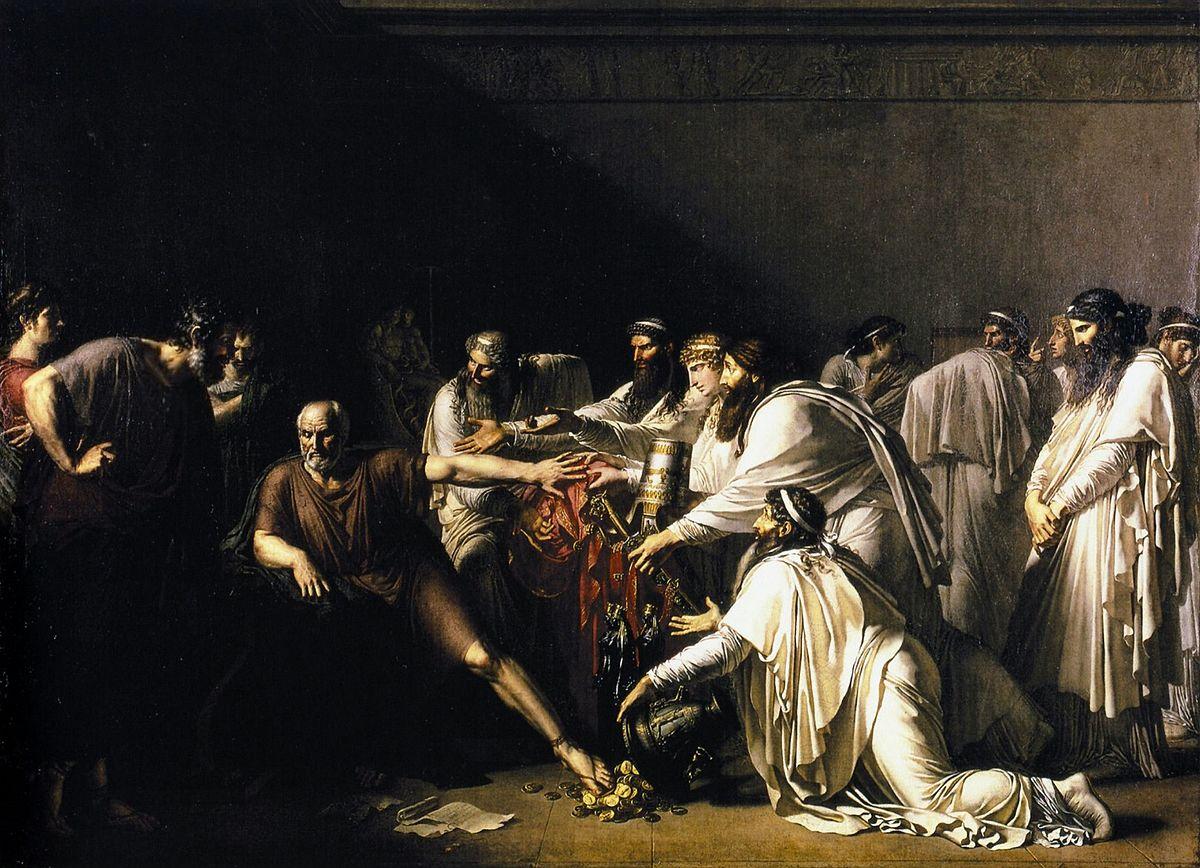“
I swear by Apollo, physician, by Asclepius, by Hygieia and Panacea, by all the gods and all the goddesses, taking them to witness that I will fulfill, according to my strength and my ability, the following oath and engagement: (… ) I will direct the diet of the sick to their advantage, according to my strength and my judgment, and I will refrain from all evil and all injustice.
".
This version of the Hippocratic oath, published in the 19th century, was translated by Émile Littré from very old texts written in ancient Greece.
Ritual of passage to the status of doctor, medical students recited it at the end of their training to show their ethical and moral commitments with regard to their patients, but also to their preceptors.
Defying the inescapable passage of time, the tradition has persisted, although many modifications have been made to the original statement.
Where does the Hippocratic oath come from?
The oath was bequeathed to us by Hippocrates himself, a famous ancient Greek physician and philosopher.
His work, the
Hippocratic Corpus
, includes sixty volumes combining treatises, manuals and medical studies.
The most famous text, the famous Hippocratic oath, whose oldest dating dates back to the 4th century BC.
JC, is still considered the founding brick of medical ethics.
Hippocrates would not be the only author of this colossal work.
Other contributors from ancient Greece would have lent their pen to it.
Regardless, all Greek physicians swore to follow the ethical rules of their practice set forth in the oath.
By means of promises of a strong religious nature, they committed themselves, before the gods of Olympus,
I will put my master of medicine on the same level as the authors of my days, I will share my knowledge with him and, if necessary, I will provide for his needs
"), to act for the good of their patients ("
I will direct the diet of the sick to their advantage
"), to protect them from "
evil
", while respecting medical secrecy ("
I will keep quiet about what never needs to be disclosed
").
Our elders were therefore already aware of certain ethical issues facing the profession.
As such, as stipulated in the oath, the practitioners promised never to have sexual relations with their patients, nor to give them poison or to cause an abortion by using a pessary (a kind of catheter vaginal).
Did you know ?
In Greek mythology, the god of medicine, Asclepius, was invoked when reciting the Hippocratic oath.
His attribute was a stick around which a snake is wrapped, which has become a symbol of medicine today.
Not to be confused with the symbol of pharmacists (cup of Hygieia), where the cup of Hygieia replaces the stick, and the symbol of commerce (the caduceus of Hermes) with two serpents instead of one.
What is the Hippocratic Oath today?
If the Hippocratic oath has come down to us and Western doctors continue to swear allegiance to it, it bears no resemblance to the original text.
Its value is now symbolic.
It nevertheless remains the ultimate stage in the training of any young doctor, but also of midwives and dental surgeons.
It is recited at the university during the graduation ceremony:
“
At the time of being admitted to practice medicine, I promise and swear to be faithful to the laws of honor and probity.
My first concern will be to restore, preserve or promote health in all its elements, physical and mental, individual and social.
»
Although it retains a solemn aura, this modern oath has lost its sanctity to better reflect contemporary issues.
Its main objective is to remind new doctors that they are bound by legal, moral and ethical obligations.
The text addresses several themes such as equal access to care for all, medical secrecy, euthanasia, solidarity between doctors.
However, it has no legal significance.
” READ ALSO –
“Let us stop resuscitating them”: among caregivers, the Hippocratic oath to the test of antivax
What are the other texts of medical ethics?
In addition to the strictly moral Hippocratic oath, there is a set of legislative provisions that regulate the exercise of the medical profession.
In France, this is the
code of medical ethics,
which is enshrined in the Public Health Code.
Faced with this legal text, all French doctors are responsible for their actions before the law and expose themselves to disciplinary sanctions (set out by the Council of the Order of Physicians) in the event of non-compliance with their professional duties.
Complementary to these codes, ethical recommendations are drawn up by the
European Council of Medical Orders (CEOM)
while
the National Consultative Ethics Committee (CCNE)
regularly issues opinions to shed light on ethical issues and societal issues in the fields of biology, medicine and public health.
The
Geneva declaration
is an appendix to the code of medical ethics which was adopted by the general assembly of the World Medical Association in 1948. Since then, it has been regularly updated, the last modifications dating from October 2020. Intended as an adaptation to the Hippocratic oath, it endeavors to define the physician's imperatives with regard to respect for human life.
The initial objective of this declaration was to raise awareness in the profession of the crimes committed during the Second World War, in which doctors were implicated, so that they would not happen again.
The
Declaration of Helsinki
, authored by the World Medical Association, provides ethical recommendations for physicians around the world as well as scientists involved in medical research involving human beings, human biological material and/or identifiable data.
It aims at universal regulation of all activities relating to medicine and research.


/cloudfront-eu-central-1.images.arcpublishing.com/prisa/LMLUYDJBJGF5EZP36F4UXBLLKA.jpg)




/cloudfront-eu-central-1.images.arcpublishing.com/prisa/N4SFSDTIB5D7TNCYBRHQK3QOOA.jpg)

